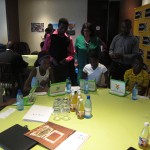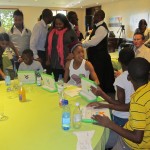Dr. Michele Borba, the inspiring parenting and educational consultant who has been working recently with OLPC, travelled to Nicaragua with Rodrigo and the deployment last week for the Ometepe project launch.  She writes, “[We] looked like a mini-United Nations representing Germany, Argentina, Italy, Colombia, Denmark, Honduras, the Dominican Republic, Bosnia, South Korea, Belgium, India and the U.S. We were teachers, bankers, doctors, writers, embassy representatives, lawyers, and businessmen, but we all shared a commonality knowing that something immensely significant was about to happen on that Island, and could feel it the moment we walked onto a huge field.”
She also visited a school that has been part of an existing OLPC project near Managua for over a year, and wrote about the history of the program there.
The first delivery of XO laptops to Nicaragua was in 2009, and the impact is already evident. Statistics show a 40% reduction in drop-outs, a decrease in retention and in violence. Best yet, parents are starting to come to the schools to be involved in their children’s learning, and the teachers recognize those laptops are affecting their teaching!
I visited a small rural primary school (San Francisco de AsÃs) outside of Managua using XO laptops since November 2010. There is now full OLPC school saturation. Positive changes are clearly apparent: the parents are more involved in their children’s education; there has been a high increase in school registration; and student learning is increasing, and here’s why.
The teachers were all trained by OLPC and continue with monthly staff development training.
Each computer is equipped with grade-level texts including natural science, geography, geometry, Nicaraguan history and culture, a dictionary, and Wikipedia, books (“Mine has Harry Potter!” one boy exclaimed), as well as programs that encourage children’s creativity, music and art. Teachers report that students are now far more engaged in learning. Parents say their kids are using the computers to continue learning at home.
Over the next hours I observed various teaching lessons using the XOs. Sixth graders working in base teams to learn how to mind-map different types of calendars (Mayan, Greco, Julian). Third graders paired with partners to identify bird species. First graders were learning how to use the XO drawing program and discovering beginning programming skills. Fourth graders were mentoring younger students…
Dr. Borba also spent some time talking to students and teachers outside of class:
[A ten-year old] told me that her computer has “greatly advanced my learning… Yesterday I learned about industrial agriculture. Tomorrow I’ll be giving a presentation in my classroom about farming techniques.” She added that her favorite laptop activity at home is doing research on Wikipedia. Her goal, she said, is to become an engineer. I have no doubt that she will.
The whole story is posted on her children and parenting blog.





